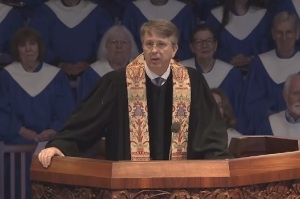Okla. gov. signs bill allowing students to leave school for religious instruction

A newly approved law will enable Oklahoma public school students to receive off-campus religious instruction during the school day if they choose to.
Oklahoma Republican Gov. Kevin Stitt signed House Bill 1425 into law Wednesday. The bill was passed by the Republican-controlled Legislature last month, with the Senate voting 38-7 and the House of Representatives voting 51-40.
The law authorizes school districts’ boards of education to “adopt a policy that excuses a student from school to attend a released time course for no more than three class periods per week or a maximum of one hundred twenty-five class periods per year.”
The legislation defines a “released time course” as “a period of time during which a student is excused from school to attend a course in religious or moral instruction taught by an independent entity off school property.”
The measure came with stipulations declaring that a student’s parent or legal guardian must provide “written consent prior to the student’s participation in the released time course” and prohibiting the use of school district funds or staff to provide the instruction.
Additionally, independent entities where students go during “released time” must keep attendance records and make them available to school districts and hold districts “harmless with regard to any liability arising from conduct that does not occur on school property under the control or supervision of the school district.” Parents are responsible for providing transportation for “released time” courses and students are responsible for any school work they miss when they leave campus.
The bill gives school and district administrators “reasonable discretion over the scheduling and timing of released time courses.” It also allows boards of education to provide students with credit for work completed as part of released time courses based on “the amount of classroom instruction time,” “the course requirements and any material used in the course,” “methods of assessment used in the course” and “the qualifications of the course instructor.”
While one Democrat joined all Republicans in supporting the measure in the state Senate, the opposite kind of defection occurred in the House, where 25 Republicans sided with Democrats in opposing it.
Greg Chafuen, legal counsel with the religious liberty legal nonprofit Alliance Defending Freedom, released a statement in support of the bill on Thursday.
“Parents have the right and responsibility to guide the upbringing and education of their children,” he said. “And many parents consider religious instruction an important part of their child’s education. While public schools can teach about the Bible from a neutral, secular perspective, release-time programs offer religious courses taught by third-party charitable organizations off school grounds during school hours.”
Chafuen added that the new law "ensures that every Oklahoman knows that the law respects their right to seek religious education for their children through these time-tested programs.”
Oklahoma is not the first state to enable students to receive off-campus religious instruction during school hours. Ohio has a similar law, and the widespread embrace of students attending Bible classes by the ministry LifeWise Academy, which resulted from it, drew backlash from the atheist legal advocacy organization Freedom From Religion Foundation.
“If parents want their children to learn about the [B]ible, there are so many ways to do it without cutting into valuable school hours,” FFRF Co-President Annie Laurie Gaylor asserted in a statement coinciding with the organization’s distribution of a letter to school districts throughout the state. “Participating students are being punished by losing hundreds of hours of academic instruction to LifeWise’s released time [B]ible study classes.”
The letter submitted to the state’s school districts explained that “FFRF has received several complaints from families in different school districts alleging that non-attending students were given busy work, or no work at all, as a consequence of staying behind during released time classes” while the organization “received at least one complaint reporting that a school assigned non-attending students additional homework seemingly as punishment for refusing to participate in a released time program.”
The United States Supreme Court ruled in the 1952 case Zorach v. Clauson that released-time programs did not violate the U.S. Constitution, finding “no constitutional requirement which makes it necessary for government to be hostile to religion and to throw its weight against efforts to widen the effective scope of religious influence.”
“When the state encourages religious instruction or cooperates with religious authorities by adjusting the schedule of public events to sectarian needs, it follows the best of our traditions,” stated the majority opinion.
“To hold that it may not would be to find in the Constitution a requirement that the government show a callous indifference to religious groups. That would be preferring those who believe in no religion over those who do believe."
Ryan Foley is a reporter for The Christian Post. He can be reached at: ryan.foley@christianpost.com



























